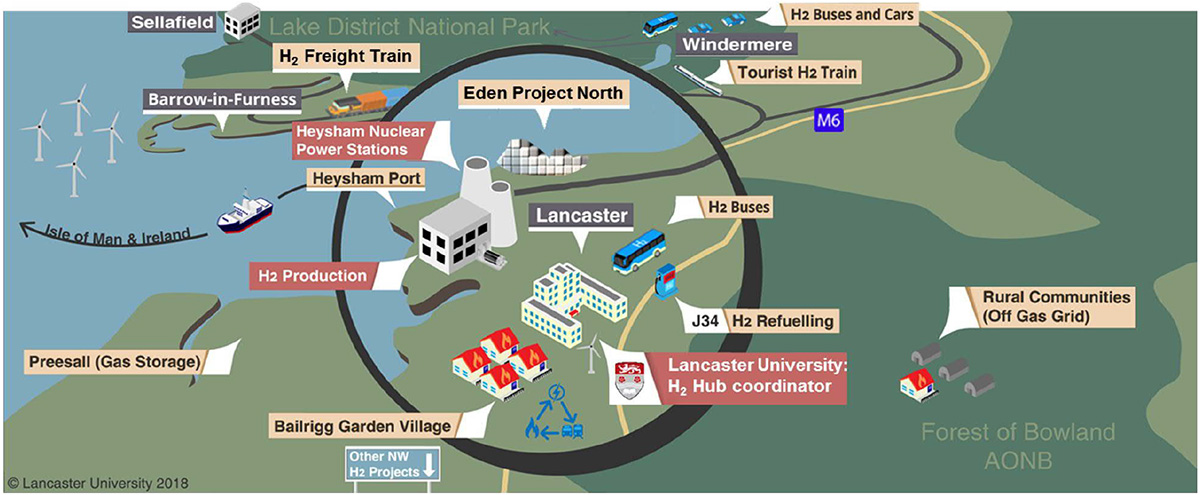
Lancaster Hydrogen Hub
We have formed the partnership behind the hub with the aim of creating the seed of a functioning and growing Hydrogen (H2) economy across the city region.
The Hub, coordinated via Energy Lancaster at Lancaster University, brings together:
- local and global energy and technology firms
- local transport companies and heat consumers
- clean-air, planning, regeneration and low-carbon stakeholders (including Councils and LEPs)
- scientists, economists and engineers
This is more than just an idea, as evident from the recently awarded BEIS grant, for our project with EDF Energy R&D UK: 'Hydrogen to Heysham'. The Lancaster Hydrogen Hub has three main aims:
- Build and grow local H2 production, storage, and transport facilities
- Decarbonise local industry & transport and heating of building estates
- Demonstrate a scalable H2 economy rolled out via incremental infrastructure investments
As illustrated above and described below, the surrounding district offers opportunities to showcase hydrogen-based transport on rail, road, and in the port, and hydrogen supported heating in estates like the University campus, the new Eden Project North, and the Bailrigg Garden Village.

Hub concepts
Green H2
EDF’s nuclear plants will produce low carbon H2 by water electrolysis. The power plants need H2 as a rotor coolant. The plants also have a demand for pure O2, the other electrolysis product.
H2 Rail
Diesel powered trains transport nuclear fuels between Heysham and Sellafield. These trains can run on H2 in the future, and they can help transport H2 as a new clean fuel into The Lake District. This would enable H2 based train and bus services and also H2 refuelling stations for other cars in the national park.
H2 Sea
Like other seaports, Heysham Port strives to reduce their local emissions, first by converting the container handling vehicles to run on H2 and later by offering H2 as a (supplement) fuel for ferries.
H2 Road
Junction 34 of the M6 with its recently opened park-and-ride system and connecting bus services will make an ideal host for the North-West’s first H2 refuelling station for cars, buses and HGVs. H2 fuelled shuttle services to Lancaster City and the Eden Project in Morecambe will ensure good impact and visibility.
H2 Transport
We will work with bus operators and city council to develop H2 based/supplemented bus and refuse collection services, combatting the high emissions that contribute to the city’s air quality issues.
H2 Energy Systems at Scale
These broad transport and built environment concepts support Lancaster’s case for piloting a functioning H2 economy at a local scale, further enhanced by significant H2 storage potential in the Preesall caverns & EDF sites UK-wide. The Lancaster Hydrogen Hub can demonstrate scale-up from campus/city to regional & national. Win-win synergies with the Eden Project North are obvious.
H2 Research, Development, Demonstration & Innovation
Our research and Innovation projects will go beyond electrolyser and fuel cell technology. We and our partners will address fuel and transport related logistics, the use of H2 as an energy vector in smart local energy systems (for transport, heating, grid), new business models and the geological, environmental, health and social aspects of larger-scale H2 storage projects.

